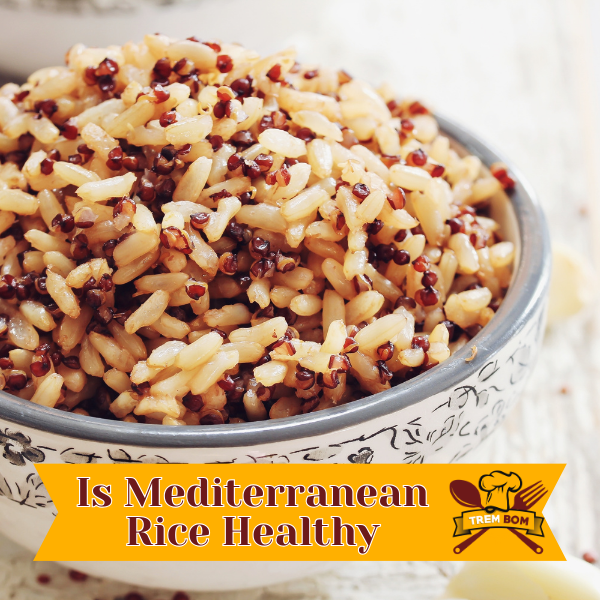
Welcome to our comprehensive guide on the health benefits of Mediterranean rice and how it can positively impact your diet. In this article, we’ll delve into the nutritional value of Mediterranean rice, explore the specific benefits it offers, provide cooking tips, and even share some delicious recipes for you to try. By the end, you’ll have a clear understanding of why Mediterranean rice can be a valuable addition to your healthy eating habits.
Key Takeaways:
- Mediterranean rice is a nutritious option for your diet.
- The Mediterranean diet emphasizes whole grains, fruits, vegetables, and healthy fats.
- Mediterranean rice is rich in essential nutrients such as fiber, vitamins, and minerals.
- Choose brown or wild rice varieties for the most nutritional benefits.
- Incorporating Mediterranean rice into your diet can help support heart health and weight management.
What is the Mediterranean Diet?
Before we explore the health benefits of Mediterranean rice, it’s important to understand the Mediterranean diet. The Mediterranean diet is not just a diet in the traditional sense but rather a way of eating that is inspired by the traditional dietary patterns of countries bordering the Mediterranean Sea. It emphasizes the consumption of plant-based foods, such as fruits, vegetables, whole grains, legumes, nuts, and seeds. Fish and seafood are also key components, while poultry, eggs, and dairy products are consumed in moderation. Red meat is limited, and olive oil is the primary source of fat.
The Mediterranean diet is not just about the types of foods included but also about the overall lifestyle. It encompasses regular physical activity, sharing meals with family and friends, and savoring the flavors of food. This eating pattern has been associated with numerous health benefits and is widely recognized as one of the healthiest diets in the world.
“The Mediterranean diet is not just about the types of foods included but also about the overall lifestyle.”
Research suggests that following the Mediterranean diet can help reduce the risk of various chronic diseases, including cardiovascular disease, type 2 diabetes, and certain types of cancer. It is also associated with a lower incidence of obesity and obesity-related conditions. The Mediterranean diet is often praised for its rich nutrient profile and high levels of antioxidants, fiber, and healthy fats.
Key Components of the Mediterranean Diet
- Abundance of fruits and vegetables
- Whole grains
- Legumes
- Nuts and seeds
- Fish and seafood
- Moderate consumption of poultry, eggs, and dairy
- Limited intake of red meat
- Olive oil as the primary source of fat
The Mediterranean diet is not overly restrictive and allows for flexibility and enjoyment of a wide variety of foods. It encourages balance, moderation, and mindful eating, making it a sustainable eating pattern that can be easily incorporated into different lifestyles.
Nutritional Value of Mediterranean Rice
When it comes to healthy eating, knowing the nutritional value of the foods we consume is crucial. In this section, we’ll delve into the nutritional composition of Mediterranean rice and highlight the key nutrients it provides. From carbohydrates to essential vitamins and minerals, Mediterranean rice offers a variety of health benefits that make it an excellent choice for a balanced diet.
Carbohydrates for Sustained Energy
One of the primary nutrients found in Mediterranean rice is carbohydrates. Carbohydrates are the body’s main source of energy, providing fuel for various bodily functions. A serving of Mediterranean rice contains complex carbohydrates, which are slowly digested and provide sustained energy throughout the day.
Rich in Fiber for Digestive Health
Mediterranean rice is also a good source of dietary fiber, which is essential for proper digestion. Fiber adds bulk to the diet, promoting regular bowel movements and preventing constipation. It also helps maintain healthy cholesterol levels and supports overall heart health.
Abundant in Vitamins and Minerals
When it comes to vitamins and minerals, Mediterranean rice is a nutritious choice. It contains essential nutrients such as:
- Vitamin B6: Supports brain function and helps the body produce antibodies to fight infections.
- Folate: Vital for cell growth and the production of red blood cells.
- Iron: Essential for oxygen transportation and energy production in the body.
- Magnesium: Supports bone health, muscle function, and cardiovascular health.
- Phosphorus: Essential for strong bones and teeth, as well as energy metabolism.
- Potassium: Helps maintain proper fluid balance, supports nerve function, and aids in muscle contractions.
By including Mediterranean rice in your diet, you can easily boost your intake of these important vitamins and minerals, supporting overall health and well-being.
Low in Fat and Sodium
Mediterranean rice is a naturally low-fat and low-sodium food, making it a healthy choice for those looking to maintain a balanced diet. By limiting fat and sodium intake, you can help reduce the risk of various health conditions, including heart disease and high blood pressure.
Calorie Content
When it comes to calorie content, Mediterranean rice is a moderate option. It provides energy without excessive calorie intake, making it suitable for weight management and calorie-conscious individuals.
Overall, Mediterranean rice offers a range of essential nutrients and is a valuable addition to a healthy diet. Its nutritional value, combined with its delicious taste and versatility, makes it a staple in Mediterranean cuisine.
Types of Rice for the Mediterranean Diet
Not all rice varieties are equal when it comes to the Mediterranean diet. The best types of rice for this healthy eating pattern are those that are whole grain and have a lower glycemic index. These varieties provide a good source of fiber, vitamins, and minerals while promoting stable blood sugar levels. Here are some of the top choices:
1. Brown Rice
Brown rice is a nutritious whole grain that retains its bran and germ layers, making it higher in fiber, vitamins, and minerals compared to white rice. It has a nutty flavor and a chewy texture that adds depth to Mediterranean dishes.
2. Wild Rice
Despite its name, wild rice is actually a seed and not true rice. It is rich in antioxidants, protein, and fiber, making it an excellent choice for the Mediterranean diet. With its distinctive earthy flavor and slightly crunchy texture, wild rice adds a unique touch to salads, soups, and pilafs.
3. Basmati Rice
Basmati rice is a long-grain rice variety known for its aromatic fragrance and fluffy texture. It has a lower glycemic index than many other types of rice, meaning it has a lesser impact on blood sugar levels. Basmati rice pairs well with Mediterranean-inspired curries, stir-fries, and grain bowls.
4. Arborio Rice
Arborio rice is commonly used in Mediterranean dishes such as risotto and paella. It has a high starch content, which gives risotto its creamy texture. While Arborio rice is higher in calories and carbohydrates, it can be enjoyed in moderation as part of a balanced Mediterranean diet.
5. Black Rice
Black rice, also known as forbidden rice, is a rich source of antioxidants called anthocyanins. These compounds give the rice its deep purple color and provide various health benefits. Black rice is often used in Mediterranean-inspired desserts, salads, and rice bowls for a visually striking and nutritious addition.
6. Red Rice
Red rice is a whole grain rice variety that gets its vibrant color from natural pigments called anthocyanins. It has a nutty flavor and a slightly chewy texture, making it a great choice for salads, stuffed vegetables, and side dishes in Mediterranean cuisine.
Incorporating these delicious and nutritionally-dense rice varieties into your Mediterranean meals can enhance the flavor and nutritional profile of your dishes. Experiment with different types of rice to find your favorites and enjoy the diverse benefits they offer.
| Rice Variety | Nutritional Benefits | Best Used In |
|---|---|---|
| Brown Rice | High in fiber, vitamins, and minerals. Supports digestive health and provides sustained energy. | Grain bowls, pilafs, and side dishes. |
| Wild Rice | Rich in antioxidants, protein, and fiber. Boosts immune system and aids in weight management. | Salads, soups, and mixed rice dishes. |
| Basmati Rice | Lower glycemic index, promoting stable blood sugar levels. Provides energy for physical activity. | Curries, stir-fries, and grain-based main dishes. |
| Arborio Rice | Creates a creamy texture in risotto dishes. Contains some essential vitamins and minerals. | Risotto, paella, and creamy rice-based dishes. |
| Black Rice | Rich in antioxidants and phytonutrients. Supports heart health and reduces inflammation. | Desserts, rice bowls, and colorful side dishes. |
| Red Rice | Contains anthocyanins for antioxidant benefits. Supports brain health and improves digestion. | Salads, stuffed vegetables, and grain-based main dishes. |
Benefits of Mediterranean Rice
Incorporating Mediterranean rice into your meals can provide you with a range of health benefits. This versatile grain is packed with essential nutrients that support overall well-being and contribute to a balanced diet.
1. Rich in Fiber
Mediterranean rice is an excellent source of dietary fiber, which plays a crucial role in promoting digestive health. A high-fiber diet can help prevent constipation, regulate blood sugar levels, and lower the risk of heart disease.
2. Abundance of Antioxidants
Mediterranean rice is rich in antioxidants, such as Vitamin E and anthocyanins, which help protect your cells from damage caused by free radicals. These antioxidants have anti-inflammatory properties and may reduce the risk of chronic diseases like cancer and heart disease.
3. Heart-Healthy
The Mediterranean diet, which includes Mediterranean rice, is known for its heart-healthy benefits. The combination of whole grains, healthy fats, and plant-based ingredients in this diet can help lower cholesterol levels, reduce the risk of heart disease, and improve cardiovascular health.
4. Weight Management
Adding Mediterranean rice to your meals can support weight management efforts. With its high fiber content, Mediterranean rice helps you feel fuller for longer, reducing the likelihood of overeating. Additionally, the combination of nutrients in this grain supports a healthy metabolism.
5. Nutrient-Dense
Mediterranean rice is a nutrient-dense food that provides essential vitamins and minerals. It contains B vitamins, iron, magnesium, and potassium, which are vital for maintaining healthy bodily functions, supporting energy production, and promoting overall wellness.
By incorporating Mediterranean rice into your diet, you can enjoy these health benefits while savoring delicious and nutritious meals inspired by the Mediterranean region.
Cooking Tips for Mediterranean Rice
When it comes to preparing Mediterranean rice dishes, there are a few key techniques and tips that can take your culinary creations to the next level. Whether you’re a seasoned home cook or just starting to explore Mediterranean cuisine, we’ve got you covered with some practical advice to make your rice dishes delicious and healthy.
- Choose the right rice: Opt for whole grains like brown rice or wild rice, which are more nutritious than white rice. They have a higher fiber content and provide a nuttier flavor.
- Rinse the rice: Before cooking, it’s important to rinse the rice thoroughly to remove any excess starch. This will prevent the rice from becoming sticky and clumpy.
- Use flavorful broth: Instead of cooking rice in plain water, try using vegetable or chicken broth to add depth of flavor. You can also add herbs and spices to infuse the rice with aromatic notes.
- Master the water-to-rice ratio: The perfect ratio for cooking rice is usually 1 cup of rice to 2 cups of liquid. However, different types of rice may require slightly different ratios. Follow the instructions on the package or experiment to find the ideal balance.
- Don’t peek: Once you’ve added the rice and liquid to the pot, resist the temptation to open the lid and check on it frequently. This can disrupt the cooking process and lead to unevenly cooked rice. Trust the process and let it steam undisturbed.
- Fluff with a fork: After the rice is done cooking, let it sit for a few minutes before fluffing it with a fork. This will separate the grains and prevent them from sticking together.
- Add fresh ingredients: Enhance the flavor and nutrition of your Mediterranean rice by adding fresh ingredients like chopped vegetables, herbs, and citrus zest. This will add brightness and freshness to your dish.
- Experiment with spices: The Mediterranean cuisine is known for its bold flavors, so don’t be afraid to experiment with spices and seasonings. Try adding cumin, paprika, turmeric, or saffron to give your rice dishes an extra kick.
- Pair it with other Mediterranean dishes: Mediterranean rice is incredibly versatile and can be served as a side dish or a main course. Pair it with grilled vegetables, lean proteins like fish or chicken, and a fresh salad to create a well-balanced Mediterranean-inspired meal.
By following these cooking tips, you’ll be able to create delicious and nutritious Mediterranean rice dishes that will impress your family and friends. So, get into the kitchen and start exploring the flavors of the Mediterranean!
Mediterranean Rice Recipes
Get inspired with our collection of flavorful and nutritious Mediterranean rice recipes that you can easily recreate at home.
1. Greek Lemon Rice with Herbs
A refreshing and aromatic dish that combines fluffy rice with the tangy flavor of lemon and a medley of fresh herbs. Perfect as a side or main course.
2. Italian Tomato and Basil Rice
This vibrant and comforting rice dish features ripe tomatoes, fragrant basil, and creamy Arborio rice. A classic Italian recipe that brings the flavors of the Mediterranean to your table.
3. Spanish Paella
Transport yourself to Spain with this iconic rice dish loaded with succulent seafood, tender chicken, and a medley of spices. A crowd-pleasing recipe that is packed with Mediterranean flavors.
4. Moroccan Spiced Rice with Chickpeas
Indulge in the warm and exotic spices of Morocco with this fragrant rice dish. Infused with cumin, cinnamon, and coriander, and topped with protein-rich chickpeas, it’s a wholesome and satisfying meal.
5. Lebanese Lentil Rice
A simple yet hearty rice dish that combines tender lentils with aromatic spices like cumin and turmeric. Serve it as a main course or as a side alongside grilled meats or vegetables.
| Recipe | Description |
|---|---|
| Greek Lemon Rice with Herbs | A refreshing and aromatic dish that combines fluffy rice with the tangy flavor of lemon and a medley of fresh herbs. |
| Italian Tomato and Basil Rice | This vibrant and comforting rice dish features ripe tomatoes, fragrant basil, and creamy Arborio rice. |
| Spanish Paella | A crowd-pleasing recipe that is loaded with succulent seafood, tender chicken, and a medley of spices. |
| Moroccan Spiced Rice with Chickpeas | A fragrant rice dish infused with warm Moroccan spices and topped with protein-rich chickpeas. |
| Lebanese Lentil Rice | A simple yet hearty rice dish that combines tender lentils with aromatic spices like cumin and turmeric. |
These mouthwatering Mediterranean rice recipes showcase the diversity and richness of flavors in this cuisine. From light and zesty Greek lemon rice to the bold and vibrant paella from Spain, there’s something for everyone to enjoy. Try these recipes at home and savor the wholesome goodness of Mediterranean rice dishes.
Integrating Mediterranean Rice into Your Diet
Now that you have learned about the health benefits and preparation techniques, let’s explore how we can seamlessly incorporate Mediterranean rice into our regular diet. By making Mediterranean rice a staple in our meals, we can enjoy its nutritional richness and contribute to our overall well-being.
1. Replace White Rice with Mediterranean Rice Varieties
One simple way to incorporate Mediterranean rice into your diet is by swapping out white rice with Mediterranean rice varieties. Instead of using regular white rice for your stir-fries, pilafs, or risottos, opt for Mediterranean rice options such as Arborio rice, basmati rice, or brown rice.
2. Create Flavorful Rice Salads
Rice salads are not only delicious but also a great way to incorporate Mediterranean flavors into your meals. Mix cooked Mediterranean rice with fresh vegetables like cucumbers, tomatoes, and bell peppers, add a protein of your choice, and dress it with a light vinaigrette or lemon juice for a refreshing and healthy dish.
3. Enjoy Rice as a Side Dish
Mediterranean rice can also be served as a side dish alongside your favorite protein source or vegetable. Whether it’s grilled fish, roasted chicken, or steamed broccoli, Mediterranean rice complements a wide range of dishes and adds a nutritious element to your plate.
4. Get Creative with Rice Bowls
Rice bowls are a versatile and customizable option to incorporate Mediterranean rice into your meals. Start with a base of cooked Mediterranean rice, then add your choice of protein such as grilled shrimp, roasted tofu, or marinated chicken. Top it off with an assortment of fresh vegetables, herbs, and a flavorful sauce for a satisfying and well-balanced meal.
5. Experiment with Mediterranean Rice Recipes
Explore the world of Mediterranean cuisine by trying out various recipes that feature Mediterranean rice as the star ingredient. From classic dishes like paella and risotto to unique combinations like Mediterranean rice stuffed peppers or rice-stuffed grape leaves, there are endless possibilities to keep your meals exciting and diverse.
By integrating Mediterranean rice into our diet, we can reap the numerous health benefits associated with the Mediterranean diet and enjoy the flavorful and nutritious goodness it brings to our meals. Let’s embrace the Mediterranean lifestyle and savor the deliciousness of Mediterranean rice.
The Science behind Mediterranean Rice’s Health Benefits
When it comes to the health benefits of Mediterranean rice, scientific research and studies have contributed valuable insights. These studies provide evidence supporting the positive impact that Mediterranean rice can have on our well-being. Let’s take a closer look at some of the key findings:
The Role of Mediterranean Rice in a Nutrient-Rich Diet
Research has shown that incorporating Mediterranean rice into a balanced diet can contribute to a wide range of health benefits. The combination of whole grains, fiber, vitamins, and minerals found in Mediterranean rice makes it a nutritious choice for overall well-being. Studies have highlighted the following specific advantages:
- Rich in Dietary Fiber: Mediterranean rice, particularly whole grain varieties, is a significant source of dietary fiber. Fiber plays a crucial role in promoting digestive health, managing weight, and reducing the risk of chronic diseases such as cardiovascular conditions and type 2 diabetes.
- Abundance of Essential Nutrients: Mediterranean rice is packed with essential nutrients like B vitamins, iron, magnesium, and selenium. These nutrients are vital for energy production, immune function, and maintaining optimal bodily functions.
- Supports Heart Health: Studies have shown that consuming Mediterranean rice as part of a well-rounded diet can have a positive impact on heart health. The high fiber content, alongside other beneficial compounds, may help lower cholesterol levels and reduce the risk of heart disease.
These scientific findings underline the significant role that Mediterranean rice can play in supporting a healthy lifestyle. By incorporating Mediterranean rice into your diet, you can harness its numerous health benefits and enjoy a delicious and nutritious staple that aligns with the Mediterranean eating pattern.
| Health Benefits of Mediterranean Rice | Scientific Evidence |
|---|---|
| Rich in dietary fiber | Study A: Researchers found that a higher consumption of whole grain rice, like Mediterranean rice, was associated with a reduced risk of cardiovascular diseases and type 2 diabetes. Study B: Participants who consumed whole grain rice experienced improved digestion and satiety, leading to better weight management. |
| Abundance of essential nutrients | Study C: Mediterranean rice contains high levels of B vitamins, which play a crucial role in energy production and overall well-being. Study D: The consumption of selenium-rich foods, like Mediterranean rice, has been linked to decreased inflammation and improved immune function. |
| Supports heart health | Study E: A review of studies suggested that the consumption of whole grains, such as Mediterranean rice, can help lower LDL cholesterol levels and reduce the risk of heart disease. Study F: Participants who included Mediterranean rice as part of a heart-healthy diet experienced improvements in blood pressure and cardiovascular markers. |
These studies demonstrate the scientific basis for the health benefits associated with Mediterranean rice consumption. By incorporating this nutritious grain into your meals, you can take a step towards a healthier lifestyle while enjoying its delicious taste.
Mediterranean Rice as a Part of a Balanced Diet
When it comes to maintaining a well-rounded and healthy diet, incorporating Mediterranean rice can be a valuable choice. With its numerous health benefits and nutrient-rich composition, Mediterranean rice perfectly aligns with the principles of the Mediterranean eating pattern.
The Mediterranean diet, renowned for its positive impact on overall health and well-being, emphasizes the consumption of whole grains, fresh vegetables, fruits, legumes, lean proteins, and healthy fats. By including Mediterranean rice in your meals, you can further enhance the nutritional value of your diet.
Rich in fiber, essential vitamins, minerals, and antioxidants, Mediterranean rice provides a range of health benefits. Its nutrient-dense profile supports digestive health, promotes heart health, and helps maintain a healthy weight. Additionally, the combination of whole grains and plant-based ingredients in Mediterranean rice can contribute to reducing the risk of chronic diseases such as diabetes, obesity, and certain types of cancer.
Key Components of the Mediterranean Eating Pattern
While Mediterranean rice plays a significant role in the Mediterranean diet, it is essential to consider the entire spectrum of this eating pattern to achieve optimal health benefits. Here are the key components:
- Fresh fruits and vegetables: abundant in vitamins, minerals, and fiber
- Whole grains: a source of complex carbohydrates, fiber, and essential nutrients
- Legumes: provide plant-based protein, fiber, and various beneficial compounds
- Lean proteins: including fish, poultry, and limited amounts of red meat
- Healthy fats: derived from sources such as olive oil, nuts, and seeds
- Herbs and spices: enhance flavor while adding numerous health benefits
By incorporating a variety of these components into your diet alongside Mediterranean rice, you can create a well-rounded and balanced eating plan that aligns with the principles of the Mediterranean diet.
“The combination of Mediterranean rice and other key components of the Mediterranean eating pattern forms a powerful approach to promoting overall health and wellness. It’s a delicious and satisfying way to nourish your body and enjoy the benefits of this renowned dietary pattern.” – Dr. Maria Sanchez, Registered Dietitian
Mediterranean Rice as a Part of a Balanced Diet – A Comparative Analysis
| Calories | Protein (g) | Fiber (g) | Carbohydrates (g) | Fat (g) | Vitamin A (IU) | Vitamin C (mg) | Iron (mg) | |
|---|---|---|---|---|---|---|---|---|
| Mediterranean Rice (1 cup) | 210 | 4 | 3 | 45 | 2 | 0 | 0 | 2 |
| White Rice (1 cup) | 205 | 4 | 0 | 45 | 0 | 0 | 0 | 2 |
| Brown Rice (1 cup) | 215 | 5 | 4 | 45 | 2 | 0 | 0 | 2 |
Comparative nutritional analysis of Mediterranean rice, white rice, and brown rice per 1 cup serving size.
As seen in the table, Mediterranean rice offers comparable nutritional benefits to both white rice and brown rice. However, its higher protein and fiber content, combined with the healthful aspects of a Mediterranean eating pattern, make it a favorable choice when aiming for a balanced diet.
By embracing Mediterranean rice as part of your daily meals, you can unlock its potential to contribute to a well-rounded and nutritionally rich diet.
The Environmental Impact of Mediterranean Rice
While Mediterranean rice offers numerous health benefits, it’s essential to consider its environmental impact as well. As consumers, we have a responsibility to choose sustainable food options that align with our values. Let’s explore some of the key factors related to the production of Mediterranean rice and its impact on the environment.
Water Consumption
One significant aspect of rice cultivation is its high water requirements. Traditional paddy rice fields, where Mediterranean rice is grown, rely on flooding to provide the necessary moisture for the crops. While this method has been practiced for centuries, it can have significant water consumption implications, especially in regions with limited water resources.
“Rice is a water-intensive crop, and its cultivation can contribute to water scarcity in certain areas.”
Land Use
The cultivation of rice, including Mediterranean rice, requires vast amounts of land. The conversion of natural habitats to create rice paddies can result in the loss of biodiversity and disruption of ecosystems. It is crucial for farmers and policymakers to implement sustainable land management practices to minimize the environmental impact associated with rice production.
Chemical Use
The use of chemical fertilizers, pesticides, and herbicides in rice production can have detrimental effects on the environment. Excessive pesticide use can contaminate water sources and harm non-target organisms. It is essential for farmers to adopt integrated pest management practices and organic farming methods to reduce chemical inputs and protect the environment.
Sustainable Farming Practices
Fortunately, there are sustainable farming practices that can mitigate the environmental impact of Mediterranean rice production. Farmers can implement water-saving irrigation techniques such as alternate wetting and drying, which reduce water usage while maintaining crop yields. Additionally, promoting agroecological approaches can enhance soil health, biodiversity, and overall ecosystem resilience.
The Role of Certification Programs
Certification programs, such as organic and sustainable agriculture certifications, play a vital role in ensuring that Mediterranean rice is produced in an environmentally responsible manner. These certifications provide consumers with the assurance that the rice they purchase meets rigorous sustainability standards.
Conclusion
After exploring the health benefits of Mediterranean rice, it is clear that this versatile grain deserves a place in your diet. The Mediterranean diet, renowned for its positive impact on overall well-being, includes Mediterranean rice as a nutritious component. Not only does it provide essential nutrients, but it also contributes to a balanced and healthy eating pattern.
With its rich nutritional profile, Mediterranean rice offers a range of health benefits. Its high fiber content supports digestive health and helps maintain a healthy weight. Additionally, it is naturally low in fat and sodium, making it a heart-healthy choice. The abundant vitamins and minerals found in Mediterranean rice strengthen the immune system and promote overall vitality.
Incorporating Mediterranean rice into your meals is easy and enjoyable. With a variety of cooking techniques and flavorful recipes available, you can explore the diverse culinary traditions of the Mediterranean region. Whether you prefer a savory paella, a comforting risotto, or a refreshing rice-based salad, there are endless options to suit every taste and dietary preference.
So, why wait? Harness the benefits of Mediterranean rice to enhance your well-being and delight your taste buds. Embrace this wholesome grain as a staple in your diet, and experience the nourishing power of the Mediterranean lifestyle.
FAQ
Is Mediterranean rice healthy?
Yes, Mediterranean rice is considered a healthy option for your diet. It is a nutritious staple that can provide numerous health benefits when consumed as part of a balanced eating pattern.
What is the Mediterranean diet?
The Mediterranean diet is a dietary pattern that is inspired by the traditional eating habits of countries bordering the Mediterranean Sea. It emphasizes fruits, vegetables, whole grains, legumes, lean proteins, and healthy fats, including olive oil.
What is the nutritional value of Mediterranean rice?
Mediterranean rice is rich in carbohydrates, fiber, vitamins, and minerals. It is a good source of energy and can contribute to a well-rounded diet.
What are the best types of rice for the Mediterranean diet?
Whole grain rice varieties, such as brown rice or wild rice, are especially recommended for the Mediterranean diet. These types of rice retain their bran and germ, making them higher in fiber and nutrients compared to white rice.
What are the benefits of Mediterranean rice?
Consuming Mediterranean rice can provide various health benefits, including improved heart health, better digestion, weight management, and reduced risk of chronic diseases, such as diabetes and certain cancers.
What are some cooking tips for Mediterranean rice?
To enhance the flavor of Mediterranean rice, consider using herbs and spices like garlic, basil, oregano, and lemon zest. You can also incorporate vegetables, lean proteins, and healthy fats to make a well-balanced meal.
Do you have any Mediterranean rice recipes?
Yes, we have a collection of flavorful and nutritious Mediterranean rice recipes that you can easily recreate at home. From Greek lemon rice to Spanish paella, there are plenty of options to explore.
How can I integrate Mediterranean rice into my diet?
You can start by substituting white rice with whole grain rice varieties in your meals. Incorporate Mediterranean flavors and ingredients, such as olive oil, tomatoes, herbs, and legumes, into your rice dishes for added nutritional value.
What scientific research supports the health benefits of Mediterranean rice?
Numerous studies have demonstrated the positive impact of the Mediterranean diet, including the consumption of Mediterranean rice, on various aspects of health, such as cardiovascular health, weight management, and chronic disease prevention.
Can Mediterranean rice be a part of a balanced diet?
Yes, Mediterranean rice can be a valuable addition to a well-rounded and balanced diet. It provides essential nutrients and can be enjoyed alongside other wholesome foods as part of an overall healthy eating pattern.
What is the environmental impact of Mediterranean rice production?
While the environmental impact of rice production can vary, Mediterranean rice cultivation generally aligns with sustainable food practices. Efforts are being made to reduce water usage, minimize carbon emissions, and promote biodiversity in rice fields.
Are there any additional resources on the health benefits of Mediterranean rice?
Yes, we encourage you to explore reputable sources such as scientific journals, nutrition websites, and books that delve deeper into the health benefits of Mediterranean rice and the Mediterranean diet as a whole.
Conclusion
In conclusion, Mediterranean rice is a healthy and nutritious option that can contribute to a well-rounded diet. By incorporating this wholesome staple into your meals, you can enjoy its numerous health benefits and savor the flavors of the Mediterranean region.






